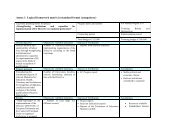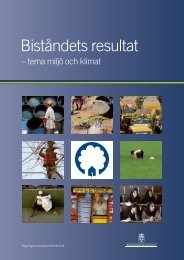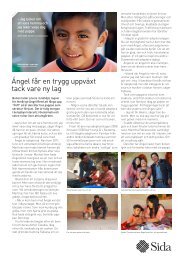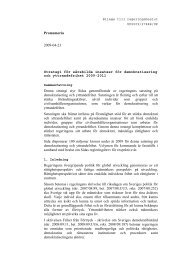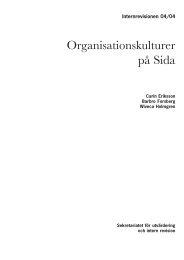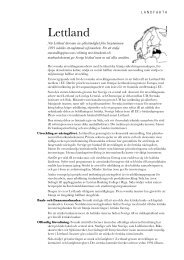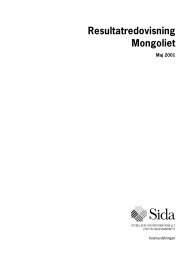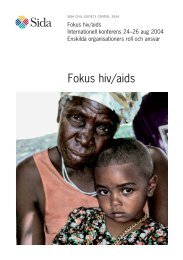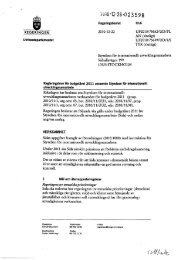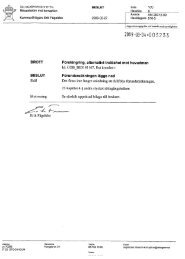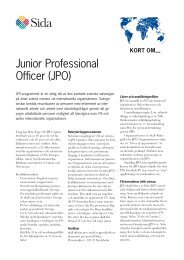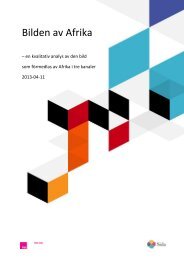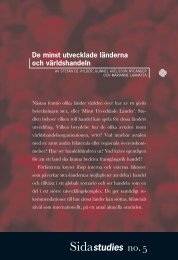Mid-Term Review of the AGIR Programme - Sida
Mid-Term Review of the AGIR Programme - Sida
Mid-Term Review of the AGIR Programme - Sida
Create successful ePaper yourself
Turn your PDF publications into a flip-book with our unique Google optimized e-Paper software.
A N N E X 2 – T E R M S O F R E F E R E N C E<br />
c) Actively promote <strong>the</strong> implementation <strong>of</strong> <strong>the</strong> Paris Declaration and <strong>the</strong> Accra<br />
Agenda for Action in relation to civil society (“good donorship”).<br />
Sweden is so far <strong>the</strong> only core donor to <strong>the</strong> <strong>AGIR</strong> programme. Denmark supports one<br />
intermediary (SCC) and <strong>the</strong> Ne<strong>the</strong>rlands will support one intermediary (Oxfam<br />
Novib), with <strong>the</strong> Ne<strong>the</strong>rlands intending to enter as core donors after <strong>the</strong> current<br />
agreement period.<br />
Evaluation purpose, intended use and intended users<br />
The <strong>Mid</strong>-<strong>Term</strong> <strong>Review</strong> is meant to provide <strong>the</strong> existing donors and <strong>the</strong> intermediaries<br />
with recommendations on how to improve <strong>the</strong> programme guidelines or <strong>the</strong><br />
functioning <strong>of</strong> <strong>the</strong> programme to ensure more effective and efficient implementation<br />
to reach <strong>the</strong> desired outcomes and impact.<br />
The <strong>Mid</strong>-<strong>Term</strong> <strong>Review</strong> is also supposed to give new donors interested in joining <strong>the</strong><br />
programme valuable insights to guide <strong>the</strong>ir decisions on support.<br />
The <strong>Mid</strong>-<strong>Term</strong> review should:<br />
1. Assess <strong>the</strong> value added <strong>of</strong> <strong>the</strong> <strong>AGIR</strong> programme approach;<br />
2. Determine <strong>the</strong> programme’s effectiveness regarding achieving results at outcome<br />
level as well as to determine <strong>the</strong> programme’s relevance and potential<br />
for impact;<br />
3. Advice on changes needed in <strong>the</strong> programme guidelines or in <strong>the</strong> general<br />
functioning <strong>of</strong> <strong>the</strong> programme;<br />
4. Serve as a basis for decisions on continued Swedish support and <strong>the</strong> possibility<br />
<strong>of</strong> accepting more donors into <strong>the</strong> programme.<br />
Evaluation questions and expected results<br />
1. To learn if <strong>the</strong> programme is having <strong>the</strong> intended outcomes – and if not, why.<br />
2. To learn if <strong>the</strong> programme is likely to also produce <strong>the</strong> expected impacts (and<br />
also if <strong>the</strong> initial focus on national partners has had a negative influence on<br />
this).<br />
3. To advice on impact reporting and results-based management.<br />
4. To assess how effectively <strong>the</strong> programme is being implemented and to recommend<br />
improvements to <strong>the</strong> implementation.<br />
5. To learn about partner satisfaction with <strong>the</strong> programme and about how <strong>the</strong><br />
programme has contributed to <strong>the</strong>ir internal development from <strong>the</strong> start.<br />
6. To suggest changes to <strong>the</strong> general guidelines or functioning <strong>of</strong> <strong>the</strong> programme<br />
(an update <strong>of</strong> <strong>the</strong> requirement for partner organisations to have a national impact<br />
for example).<br />
7. To suggest improvements that will make <strong>the</strong> programme more likely to<br />
achieve expected outcomes and impact.<br />
8. To advice on how to better address cross-cutting issues (especially gender).<br />
9. To determine <strong>the</strong> suitability <strong>of</strong> accepting more donors to <strong>the</strong> programme.<br />
10. To advice on <strong>the</strong> underlying principles for accepting more donors, as well as<br />
formats for cooperation between donors.<br />
81



